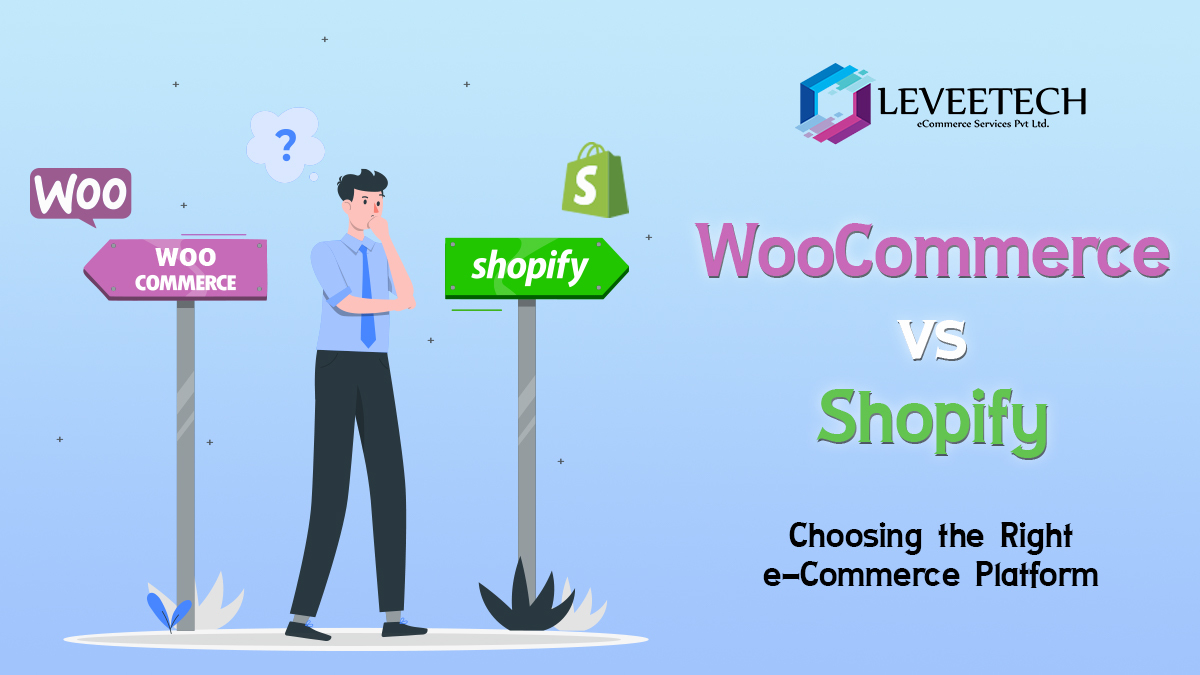When setting up an ecommerce website, selecting the right platform is crucial to your business’s success. Two popular options in the e-commerce world are WooCommerce and Shopify. Both have Pros and Cons, and the choice between them depends on your specific needs and budget.
WooCommerce and Shopify stand out as leading eCommerce platforms. Let’s compare their features to help you choose the right choice for your online store development.
WooCommerce vs Shopify
1. Hosting:
Shopify is a fully hosted ecommerce solution, which means they handle the hosting for you. This is an advantage for users who don’t want to deal with the technicalities of hosting. You don’t have to worry about server maintenance, security updates, or performance optimization. Shopify takes care of it.
On the other hand, WooCommerce is a WordPress plugin. To use it, you’ll need to find your hosting. This gives you more control over your hosting environment, and you’re responsible for its maintenance and performance. If you have experience with web hosting or prefer a specific hosting provider, WooCommerce offers flexibility in this aspect.
2. Ease of Use:
Shopify is known for its user-friendly interface, making it a great option for those new to e-commerce. It is designed to be intuitive with a drag-and-drop store builder that simplifies the setup process. You don’t need advanced technical skills to get started with Shopify. This platform streamlines the e-commerce experience, allowing you to focus on your products and customers.
Whereas WooCommerce is integrated with WordPress, a powerful content management system. This offers more customization options and can be a bit more complex for those who are not familiar with WordPress. If you’re comfortable with WordPress, WooCommerce can be a great choice. However, if you’re a complete beginner, there may be a steeper learning curve involved.
3. Customization:
WooCommerce shines when it comes to customization. Since it’s built on top of WordPress, you have access to a wide range of themes and plugins. This flexibility means you can create a unique and highly customized online store. The possibilities are nearly endless, if you have coding skills or can hire an ecommerce developer.
Shopify is not as flexible as WooCommerce. Shopify provides an easy-to-use drag-and-drop customisation interface. You can choose from a variety of themes and use the platform’s built-in tools to modify your store’s design and functionality. If you don’t need extensive customization or have limited technical expertise, Shopify’s simplicity can be a plus.
4. Cost:
Cost is a significant factor in choosing between WooCommerce and Shopify. Shopify operates on a subscription-based model with monthly fees. The pricing varies depending on your business’s needs, with additional charges for credit card transaction fees. This can be convenient for budget planning but may add up over time.
WooCommerce is free to use, being an open-source plugin for WordPress. However, this doesn’t mean it’s entirely cost-free. You’ll still need to invest in website hosting, domain registration, and possibly premium themes or plugins to enhance your store’s functionality. The total cost will depend on your specific requirements and the hosting provider you choose.
5. Scalability:
Both WooCommerce and Shopify can accommodate small to large e-commerce stores. However, when it comes to extreme scalability, WooCommerce has an advantage. WooCommerce can handle very large or complex ecommerce sites because of its open-source nature and the vast WordPress ecosystem. If you plan to build a massive online store with specific and complex requirements, WooCommerce might be the better choice.
Shopify is a strong contender for businesses of all sizes, but it may have limitations for large enterprises with unique demands. It’s essential to evaluate your growth prospects and specific business goals when considering scalability.
6. Apps and Plugins:
Shopify offers a comprehensive app store with thousands of apps and integrations that extend the platform’s functionality. This is a significant advantage for adding specific features to your store, such as email marketing, SEO tools, or inventory management. While some of these apps are free, others come with a cost.
WooCommerce has a wide range of plugins at lower costs than Shopify apps. With access to the WordPress plugin repository and third-party marketplaces, you can find solutions for various ecommerce needs. However, the extensive choices may require more research to find the right plugins for your store.
7. Payment Options:
Both WooCommerce and Shopify support a variety of payment gateways, allowing you to offer diverse payment options to your customers. Shopify also features its payment gateway known as Shopify Payments. While it may have slightly lower transaction fees compared to third-party gateways and is not available in all countries. If you need global payment options, consider the availability of gateways in your target markets.
8. Support:
Shopify provides 24/7 customer support, ensuring you have assistance whenever you need it. This can be especially reassuring for business owners who want quick solutions to issues or questions.
WooCommerce, being open-source, relies on a community of users and developers for support. You can find assistance through forums, online documentation, and potentially your hosting provider. The level of support may vary depending on your resources and technical expertise.
WooCommerce or Shopify: What’s the best?
The choice between WooCommerce and Shopify depends on your specific circumstances and requirements. Shopify is a user-friendly hosted solution that is excellent for beginners and small to medium-sized businesses. WooCommerce, on the other hand, offers more customization options and scalability, making it a preferred choice for large or technically inclined businesses. As a leading E-commerce service provider, we (Leveetech) work for both Shopify website development and WooCommerce website development.
While making your decision, consider technical skills, budget, and specific e-commerce needs. There’s no accurate answer to which one is best, but with the right platform, you can build a successful and profitable online store.








